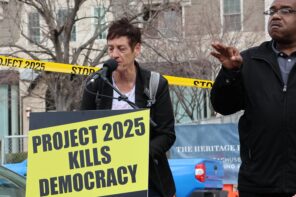As I’ve noted here on RD, conservative interpretations of Catholic theology are often more influential on the religious and political right than they’re often given credit for, largely because of the misperception that the (protestant) Christian right is the religious right. While it’s true that it’s the protestant right that’s traditionally been the electoral powerhouse of the Republican Party, much of the intellectual underpinning of cultural dogmas associated with the right have their basis in right-wing Catholic thinking.
It was conservative Catholic bishops who created the “right to life” movement with its ideology that opposition to abortion must be absolute for good Christians, back when most evangelicals could care less about the issue. It was Pope John Paul II who first conflated abortion and contraception into a “culture of death,” laying the groundwork for today’s attacks on Planned Parenthood. And it was the Catholic Church’s insistence that their health plans couldn’t cover emergency contraception that laid the groundwork for Hobby Lobby. And now, a twisted misinterpretation of Catholic teaching embraced by one of Donald Trump’s closest advisors may be poised to add fuel to the fires of nativism, misogyny and racism already powering Trump.
As the New York Times reported recently, an ancient Catholic theological concept, “church militant” is being repurposed for twenty-first century political gain, even as the church itself rejects such interpretations. Under a concept dating to early Christianity, the church was envisioned as having three parts: the Church Triumphant, which was those in heaven, the Church Penitent, which was those in purgatory, and the Church Militant, which was those on earth. The Catholics on earth were supposed to battle against sin, especially as a way to hasten the ascent of those in purgatory to heaven. This battle, as Notre Dame theology professor John Cavadini told the Times, was conceived as being waged “against interior temptations that lead you to greed and all kinds of spiritual pathologies.”
Not surprisingly, the “church militant” took on a more militaristic tone during the Crusades, and it’s that tone of militancy and triumphalism that some conservative Catholic elements have embraced, turning the personal spiritual warfare of the church militant into an excuse for an adversarial, politicized, right-wing Catholicism. The flagship of the movement is the ChurchMilitant.com web site run by Michael Voris, which rails against “globalism, immigration, social-welfare programs and abortion,” while depicting an “existential war against radical Islam,” with a healthy dose of anti-Semitism.
And in case that sounds ready-made for the Trump era, it is. As BuzzFeed reported shortly after the election, Steve Bannon, Trump’s chief strategist, addressed a Vatican conference in 2014 extolling Church militant themes. Bannon, who is Catholic, talked about a Judeo-Christian west that is “in crisis,” a “crisis both of our church, a crisis of our faith, a crisis of the West, a crisis of capitalism”:
And we’re at the very beginning stages of a very brutal and bloody conflict, of which if the people in this room, the people in the church, do not bind together and really form what I feel is an aspect of the church militant, to really be able to not just stand with our beliefs, but to fight for our beliefs against this new barbarity that’s starting, that will completely eradicate everything that we’ve been bequeathed over the last 2,000, 2,500 years.
The “new barbarity” Bannon was talking about includes state-sponsored, crony capitalism lacking the Judeo-Christian values that makes good old-fashioned capitalism such a bastion of fairness and prosperity, which, he assured his audience, was what Pope Francis was really talking about when he criticized capitalism. The other elements are the “immense secularization of the west” and “jihadist Islamic fascism.” Or, it would seem, capitalism without religion, society without religion, and, the wrong kind of religion.
The answer, according to Bannon and other self-described church militants, is an engaged, reawakened Christian West willing to fight for its values against both Godless secularism and Islam. Technically, the Catholic Church put the concept of the “church militant” to rest in 1992, when Pope John Paul approved a catechism that replaced it with the term “pilgrims on earth.” But that’s obviously a little too peaceful for Bannon and Voris and their followers. They’re building on a strain of right-wing Catholicism that’s been percolating in the United States since 2009’s Manhattan Declaration, a form of militant, mutated Catholicism/evanglical Christianity that’s just itching to pick a culture war with the secular left under the rubric of protecting the True Faith.
What’s most disturbing about the Church Militant movement is not only the suggestion that Catholicism is a religion of confrontation, but also its potential to mobilize conservative Catholics to support slashes in immigration and social welfare policies, limit civil and religious rights for Muslims, and turn the public sector over to the private in the name of promoting godly capitalism… all behind a fig-leaf of Judeo-Christian values as scant as the grants distributed by Trump’s foundation.
As the Rev. John Pawlikowski of the Catholic Theological Union told the Times about the radicalizing potential of the church militant, “If the Trump election baptizes this stuff as more authentic Catholic teaching, that would be a disaster.”





